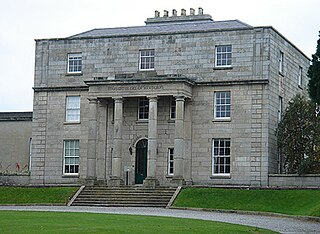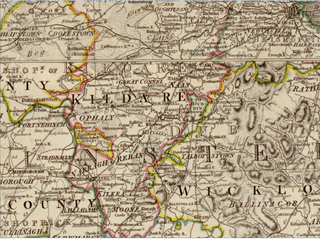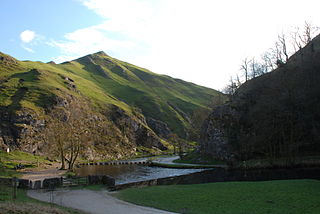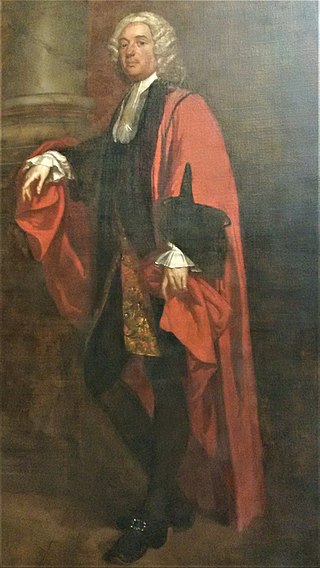
Richard Moore PC was an Irish lawyer and judge.
Sir Walter Dixon Borrowes, 4th Baronet was an Irish politician.
Sir Kildare Borrowes, 3rd Baronet was an Irish politician.
Sir Kildare Dixon Borrowes, 5th Baronet was an Irish politician.
Sir Richard Levinge, 1st Baronet was an Irish politician and judge, who played a leading part in Irish public life for more than 30 years.

Henry Singleton (1682–1759) was an Irish politician and judge, who is remembered now mainly for his friendship with Jonathan Swift, and for his notable acts of charity during the Great Irish Famine of 1740-1, in which between 300,000 and 500,000 people died. Singleton House, his impressive townhouse in Drogheda, no longer exists.
Sir Maurice Eustace was an Irish landowner, politician, barrister and judge of the seventeenth century who spent the last years of his career as Lord Chancellor of Ireland. This was an office for which he felt himself to be entirely unfit, and in which he was universally agreed to be a failure.

The High Sheriff of Kildare was the British Crown's judicial representative in County Kildare, Ireland from the 16th century until 1922, when the office was abolished in the new Free State and replaced by the office of Kildare County Sheriff. The High Sheriff had judicial, electoral, ceremonial and administrative functions and executed High Court Writs. In 1908, an Order in Council made the Lord Lieutenant the Sovereign's prime representative in a county and reduced the High Sheriff's precedence. However, the sheriff retained his responsibilities for the preservation of law and order in the county. The usual procedure for appointing the sheriff from 1660 onwards was that three persons were nominated at the beginning of each year from the county and the Lord Lieutenant then appointed his choice as High Sheriff for the remainder of the year. Often the other nominees were appointed as under-sheriffs. Sometimes a sheriff did not serve his full term due to death or another event, and another sheriff was then appointed for the remainder of the year. The dates given in this article are the dates of appointment.
Sir Thomas Luttrell was a wealthy Anglo-Irish landowner of the sixteenth-century Irish Pale. He was also a distinguished lawyer and judge who held the offices of King's Serjeant, Solicitor General for Ireland and Chief Justice of the Irish Common Pleas.
Sir Nathaniel Catelyn, was a leading English-born politician and judge in seventeenth-century Ireland. He was Speaker of the Irish House of Commons in the Irish Parliament of 1634–5, Recorder of Dublin and the first holder of the office of Second Serjeant. Despite accusations of conflict of interest and of Roman Catholic sympathies, he retained the confidence of the Crown and was a key ally of Thomas Wentworth, 1st Earl of Strafford, the Lord Deputy of Ireland.

Thomas Dowdall, also spelt Dowdale, Douedall, or Dowedall, was an Irish barrister and judge who held the office of Master of the Rolls in Ireland.
Sir John Barnewall (c.1635-c.1705) was an Irish landowner, barrister and judge, who held several judicial offices, including that of Recorder of Dublin 1687-9.
Sir Henry Echlin, 1st Baronet (1652–1725) was an Irish barrister, judge, and bibliophile. He was the first of the Echlin Baronets of Clonagh, County Kildare.
Sir Jerome Alexander (c.1585–1670) was an English-born barrister, judge and politician, who spent much of his career in Ireland, and became a substantial Irish landowner. He was a noted benefactor of Trinity College Dublin. As a judge, he was so ruthless in securing guilty verdicts in criminal cases, and in imposing the death penalty on the guilty party, that for many years after his death "to be Alexandered" was an Irish synonym for being hanged.

Eaton Stannard (1685–1755) was a leading politician and lawyer in 18th-century Ireland. He was a popular Recorder of Dublin, a very unpopular serjeant-at-law (Ireland), and an experienced parliamentarian who represented Midleton in the Irish House of Commons for many years. He is mainly remembered now as a close friend of Jonathan Swift, whose last known letter was written to him.
Thomas Burton Vandeleur was an Irish barrister and judge.
David Sherlock was an Irish Liberal Party and Home Rule League politician. He was also a successful barrister and Law Officer.
Sir Robert Dillon of Newtown near Trim was an Irish judge of the Tudor era. He served as Chief Justice of the Irish Common Pleas for more than twenty years, despite repeated calls for his removal on the grounds of age and ill health.
Robert Johnson (c.1657-1730) was an English-born politician and judge in early eighteenth-century Ireland. He sat in the Irish House of Commons and was appointed a Baron of the Exchequer. In the early 1700s, he was one of an inner circle of trusted advisors to the Lord Lieutenant of Ireland.
Richard Malone (1706–1759) was an Irish barrister and politician. He held the office of Serjeant-at-law and sat for many years in the Irish House of Commons as member for Fore.